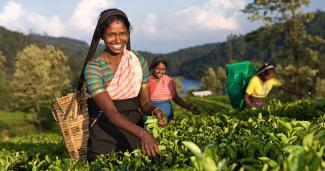
In 2000, Nilushika Silva Jayaweera (Nilu), then 21, left Sri Lanka to work as a stay-in domestic helper with a family in Singapore. After working with them for nearly a decade, she was determined to go back to school. With the support of her then-employer, she enrolled in a training programme for domestic workers at Aidha, a non-profit organisation. Over the next two years, Nilu spent her rest day on the weekend taking up courses in money management, computer literacy and entrepreneurship. Upon graduation, she began to ponder about her future.
Back in her home country, women, especially those who lived in poor rural areas, tended to face challenges when seeking employment. The limited livelihood options exacerbated their poverty, as they either depended on their husbands for financial support or earned a meagre income from agricultural work. With a vision to help these disadvantaged women improve their lives, Nilu packed her bags and returned to Sri Lanka in 2016, to start a non-governmental organisation (NGO), Emerging Hope Lanka.
The mission of Emerging Hope Lanka was to empower women towards achieving financial independence. With funds raised from the sale of a cookbook she authored, partial proceeds from her online tea business, and a crowdfunding campaign, Nilu began providing free business management classes and low-interest micro loans to women who are willing to embark on entrepreneurial journeys through Emerging Hope Lanka. Upon course completion and submission of a business plan, the participants could apply for a seed funding of S$200 to start a small business of their choice. They would have to make monthly repayments within two years.
All loan requests required Nilu’s careful evaluation, as financial assistance was not necessarily the only solution to help her programme’s prospective participants. A case in point was a debt-laden mother of two children, who was urgently in need of money. As much as Nilu would like to help the woman, there was a possibility of the latter using the loan to pay her debtors instead. Nilu hence needed to consider multiple factors to ensure that the recipients used the borrowed funds to secure a sustainable future for themselves and their families. Such dilemmas often confront Nilu in the course of managing the NGO’s funds.
The case presents insights on how a small NGO operates in an emerging economy, the challenges a woman social entrepreneur faces, as well as the due considerations given to assess applicants and manage risk, which are necessary processes in running a social microfinancing programme.
The case is written by Professor Tan Wee Liang (Associate Professor of Strategic Management, SMU Lee Kong Chian School of Business) and Dr Cheah Sin Mei of the Centre of Management Practice.
To read the case in full, please visit the CMP website by clicking here.